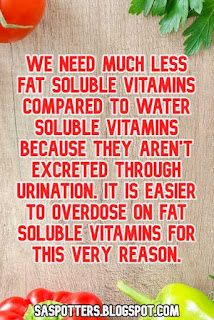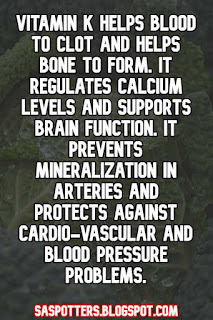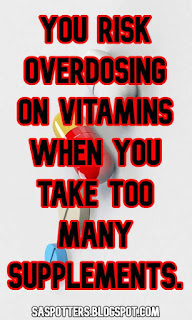Vitamin K is one of the least known vitamins. Because of this, Vitamin K is often referred to as 'the forgotten vitamin’.
Today I am going to share with you the importance of Vitamin K, good sources of this vitamin and why it is needed daily.
What is vitamin K?
Vitamin K is a fat-soluble vitamin
Vitamin K belongs to a group of vitamins that are fat soluble.
Fat soluble vitamins include vitamin A, D, E and K.
These vitamins are not excreted through urine and are stored in fat cells. This makes storing them within the body a lot easier.
They aren’t eliminated as quickly as water soluble vitamins which include Vitamin C, B1 (thiamine), B2 (riboflavin), B3 (niacin), B5 (pantothenic acid), B6, B7 (biotin), B9 (folic acid), B12 and Vitamin A when it is in its Beta-Carotene form.
We need less fat soluble vitamins because they are easily stored and they don't leak out through urination.
For example, we need about 65-90 milligrams (65-90 mg) of Vitamin C every day, but we only need 90-120 micrograms (90-120 mcg) of Vitamin K.
One micro gram is 1000 times smaller than one milligram.
In other words, we need between 720-750 times more vitamin C than what we do of Vitamin K on a daily basis.
What does vitamin K do?
Your body uses Vitamin K to make a protein called prothrombin.
Prothrombin is needed for blood to clot. It is also needed for bone formation.
Vitamin K regulates calcium levels – particularly in the bloodstream. This is a very important role, since calcium is extremely important for normal bodily functions.
Calcium is the most abundant mineral in the human body and is needed for cells to signal one another. Calcium is also needed for muscle contractions (including the heart and breathing muscles) and brain function.
Vitamin K levels are directly linked to memory. Higher Vitamin K consumption can help prevent age-related mental illnesses.
Due to Vitamin K’s relationship with calcium, it may prevent mineralization in arteries, therefore protecting against cardio-vascular illnesses and lowering blood pressure.
Vitamin K deficiency
Vitamin K deficiency is not common. Deficiency can, however, decrease the blood’s ability to clot.
This is not only important for scrapes and wounds because if blood does not clot well enough, is can cause a condition called hemorrhaging – where blood vessels lose blood into surrounding areas. This can be fatal.
Blood thinning drugs increase the body’s need for Vitamin K.
Vitamin K overload (Too much Vitamin K)
As with all vitamins and minerals, there are limits to the amount of Vitamin K that you should consume every day.
Unfortunately, no upper limits have been established for Vitamin K.
It is basically impossible to consume too much Vitamin K from natural plant sources, but over-supplementation can occur by taking more than the recommended dosage of vitamin supplements.
Sources of Vitamin K
Vitamin K1 (Phyllo Quinone) comes from plant-based foods. It is the most common form of dietary Vitamin K.
Vitamin K2 (Mena Quinone) is obtained from a few fermented and animal-based food sources. Our bodies turn Vitamin K1 into K2 for storage and usage. It is stored in the liver and fat cells.
Vitamin K3 (Mena Dione) is a synthetic, manufactured form of Vitamin K that is often used in nutritional supplements because of its vitamin K activity.
Many plants contain Vitamin K, but the highest concentrations of this vitamin come from leafy greens like spinach, parsley, lettuce and kale.
Food sources of vitamin K
- 100 grams (3.5 ounces) of Nato provides around 1103 mcg of Vitamin K (920% of your daily requirement)
-100 grams (3.5 ounces) of raw Swiss chard provides around 830 mcg of Vitamin K (692% of your daily requirement)
- 100 grams (3.5 ounces) of cooked kale provides around 817 mcg of Vitamin K (681% of your daily requirement)
-100 grams (3.5 ounces) of cooked mustard greens provides around 593 mcg of Vitamin K (494% of your daily requirement)
- 100 grams (3.5 ounces) of raw spinach provides around 483 mcg of Vitamin K (402% of your daily requirement)
- 100 grams (3.5 ounces) of cooked collard greens provides around 407 mcg of Vitamin K (339% of your daily requirement)
- 100 grams (3.5 ounces) of goose liver paste provides around 369 mcg of Vitamin K (308% of your daily requirement)
- 100 grams (3.5 ounces) of soybean oil provides around 184 mcg of Vitamin K (153% of your daily requirement)
- 100 grams (3.5 ounces) of cooked broccoli provides around 141 mcg of Vitamin K (118% of your daily requirement
- 100 grams (3.5 ounces) of cooked Brussel sprouts provides around 140 mcg of Vitamin K (117% of your daily requirement)
- 100 grams (3.5 ounces) of beef liver provides around 106 mcg of Vitamin K (88% of your daily requirement)
- 100 grams (3.5 ounces) of hard cheeses provide around 87 mcg of Vitamin K (72% of your daily requirement)
- 100 grams (3.5 ounces) of pork chops provides around 69 mcg of Vitamin K (57% of your daily requirement)
- 100 grams (3.5 ounces) of prunes provides around 60 mcg of Vitamin K (50% of your daily requirement)
- 100 grams (3.5 ounces) of chicken provides around 60 mcg of Vitamin K (50% of your daily requirement)
- 100 grams (3.5 ounces) of soft cheese provides around 59 mcg of Vitamin K (49% of your daily requirement)
- 100 grams (3.5 ounces) of cooked green beans provides around 48 mcg of Vitamin K (40% of your daily requirement)
- 100 grams (3.5 ounces) of kiwi fruit provides around 40 mcg of Vitamin K (34% of your daily requirement)
- 100 grams (3.5 ounces) of cooked green peas provides around 26 mcg of Vitamin K (22% of your daily requirement)
- 100 grams (3.5 ounces) of avocado provides around 21 mcg of Vitamin K (18% of your daily requirement)
You will be able to meet your daily requirements of Vitamin K by eating a balanced diet with enough raw fruit and vegetables.
Making sure that you get enough of all vitamins and minerals through the food that you eat will help to keep you healthy and well – for as long as possible. Stay Strong!






No comments:
Post a Comment